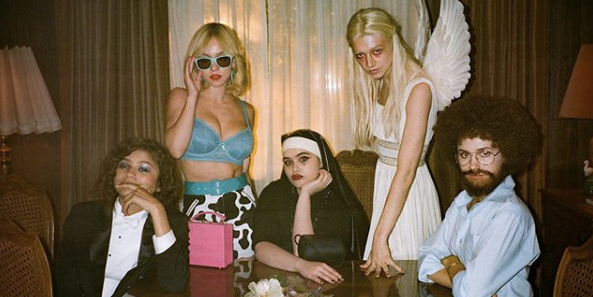Sam Levinson’s “Euphoria” is an edgy, stylish and wildly NSFW HBO drama that lives perfectly in the middle of being ultra-realistic and a bit too fantastical. Produced by Drake and starring Zendaya, the show’s prepackaged cool factor allows for “Euphoria” to authentically touch base with its subject matter in a way shows like “Riverdale” and “13 Reasons Why” are incapable of.
“Euphoria” is a glamorous yet cutting look at the lives of high schoolers struggling with drug use, body image, sexuality and coming into oneself. Directed and written by Sam Levinson and inspired by an Israeli show, “Euphoria” encapsulates the experience of being a post-social media teenager without the sense of emotional distance that similar pieces of media have. Comparable to Sam Levinson’s “Assassination Nation,” “Euphoria” takes the 21st-century fears of drugs and hackers, forcing you to sit in the extremities of it.
Prior to “Euphoria,” my thoughts and opinions on Zendaya’s acting were nonexistent. While she is a staple of the early 2010s Disney Channel generation, Zendaya has mostly existed in my mind as a fashionista with a Marvel paycheck. “Euphoria” plucks Zendaya out of the Disney archetype and displays her innate acting ability in a way that no other media has been able to. It is easy to think of Zendaya as the cute, innocent girl she typically plays, but “Euphoria” forces you to go beyond that and think of her as Rue, a queer high schooler who is constantly working on her sobriety.
Zendaya’s portrayal of Rue is heartbreaking, strong and very believable as she struggles with opioids while falling in love with her best friend. Rue’s characterization and the overall portrayal of addiction throughout “Euphoria” is very somber and authentic. Where some pieces of media may vilify the addict or are simply unable to comprehend the complexities of addiction, “Euphoria” says that this is just how some situations are.
A similarity to “Assassination Nation” comes in Levinson’s choice of music throughout the series and how it serves as an exclamation point to what is happening onscreen. For example, in the pilot when the girl characters are Juuling and driving in slow motion to a party with “Cocky AF” by Megan Thee Stallion blaring, or when Jules is struggling emotionally and losing touch with reality as the nightclub spins with Kelsey Lu’s trance-inducing rendition of “I’m Not in Love” playing throughout. Whatever the song may be, Levinson’s music choices fully immerse the viewer into his world of neon lighting and flashy makeup.
Levinson’s taste extends throughout the series as the aesthetic choices from lighting to costuming all come together to make every frame something that is post-worthy. The beauty of “Euphoria” ties into Levinson’s understanding of what it is like to grow up in a post-internet world. Beautiful shots like Rue riding her bike to her dealer’s house show how the creators of “Euphoria” understand the importance of aesthetics in today’s storytelling. There is an overall sensation of “Euphoria” and its characters being concocted from someone’s 2015 Tumblr dash.
While there is an undeniable stylishness to “Euphoria,” it is not in the least bit shallow as each episode will leave you aching for at least one character. “Euphoria” has a way of taking the greatest fears of today’s high schoolers and blowing them up. While at your core you may realize this is all a fantastical overexaggeration, you can still feel your heart cave in as Kat discovers she had a pornographic video illegally recorded and leaked of her.
“Euphoria” is able to take the temporary problems associated with high school and make them seem like the most major, important things to happen in one’s life. It should be easy to say that most of these characters’ problems will not matter in the future, but “Euphoria” forces you to believe that McKay’s freshman year of college is life or death. Even though rushing a fraternity and being scared you might not get into the NFL could seem basic, “Euphoria” uses bass-heavy music and anxiety-inducing camera angles to express that these are actually the most important issues in the world.
It helps that “Euphoria” handles each of the show’s issues with care and there is not any finger-pointing or shaming. Even when the show’s villains commit unforgivable acts, the show is still able to write these characters as being complex and imperfect. Nate commits horrible acts throughout the series, but he still has a soft side that shows he is more than just a punching bag for the show.
“Euphoria” understands that most negative acts come out of some form of trauma like Nate’s struggles with insecurities about his sexuality. This is completely unlike “13 Reasons Why,” which wrote the Bryce character as being a surface-level bad guy with no redeemable qualities. While some reviews might make it seem like “Euphoria” is a controversial mess similar to “13 Reasons Why,” “Euphoria” is completely different because the writers actually care about all of their characters. Yes, bad things happen to some of the characters, but it feels real and not like these things are happening simply to shock the audience.
“Euphoria” is unlike any other teen-centered show of the moment. “Riverdale” seems like it was written by people who have not interacted with high schoolers since the last millennium, and “13 Reasons Why” exists purely to shock and disturb. Unlike those cringey teen dramas, “Euphoria” has a strong grip on what year it is and who the show’s characters are. Sam Levinson’s “Euphoria” is a defining show of the social media generation with a solid understanding of internet culture and the problems faced by teens today.


























